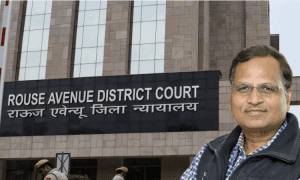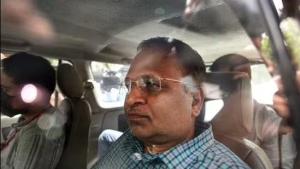New Delhi – A Delhi court has delivered a significant verdict by disposing of the Satyendar Jain PWD Irregularities Case, bringing closure to years of investigation into alleged corruption involving the Satyendar Jain, former Public Works Department minister. The ruling represents a major legal victory for the Aam Aadmi Party leader, who faced serious accusations of financial misconduct and administrative violations.
Court Accepts CBI’s Closure Report


Special Judge Dig Vinay Singh’s decision to dispose of the Satyendar Jain PWD Irregularities Case came after accepting the Central Bureau of Investigation’s closure report filed in 2022. The court’s comprehensive analysis found that despite extensive investigation spanning several years, no incriminating evidence was discovered against the former AAP minister.
The judicial verdict in the Satyendar Jain PWD Irregularities Case emphasized that the CBI could not establish any evidence of criminal conspiracy, abuse of power, pecuniary gain, or wrongful loss to the government exchequer. This finding effectively undermined the foundation of the corruption charges that had been pursued against Jain and other PWD officials.
Judge Rules Administrative Actions Don’t Warrant Corruption Charges

In a significant legal observation regarding the Satyendar Jain PWD Irregularities Case, the court stated that “not every decision made in an official capacity that does not strictly follow rule warrants invoking the Prevention of Corruption Act.” This ruling establishes an important precedent for distinguishing between administrative irregularities and criminal corruption.
The court’s analysis of the Satyendar Jain PWD Irregularities Case concluded that the alleged acts constituted at most administrative irregularities rather than criminal offenses under Section 13(1)(d) of the Prevention of Corruption Act. This distinction proved crucial in the case’s ultimate disposal rather than proceeding to trial.
Original Allegations and Investigation Background

The Satyendar Jain PWD Irregularities Case originated from a May 2018 CBI registration based on a reference from the Delhi Lieutenant Governor. The case centered on allegations of irregularities in awarding a tender to a private firm for PWD’s infrastructure projects, specifically involving the hiring of a “creative team” of consultants.
According to the FIR in the Satyendar Jain PWD Irregularities Case, Jain and other senior PWD officials, including the engineer-in-chief, were accused of breaching recruitment and financial regulations. The allegations also included outsourcing professionals for PWD projects without obtaining proper approval from the finance department.
Also Read: Omar Abdullah Drops Explosive Cryptic Hint About J&K’s Parliamentary Future
CBI Findings Exonerate Accused Officials
The Central Bureau of Investigation’s comprehensive probe into the Satyendar Jain PWD Irregularities Case revealed no evidence of criminality or personal gain by any accused party. The agency’s detailed investigation found no indication of bribery, criminal intent, or violations of financial rules that would warrant prosecution.
Specifically addressing the hiring process central to the Satyendar Jain PWD Irregularities Case, the CBI concluded that no irregularities occurred in the selection process, which was conducted based on merit and qualification. This finding directly contradicted the original allegations of improper recruitment practices.
Financial Aspects Cleared of Wrongdoing
The financial investigation component of the Satyendar Jain PWD Irregularities Case found no evidence of illicit gain by any accused individuals. The CBI determined that project expenditures remained well within the threshold delegated to the PWD, eliminating concerns about unauthorized financial commitments.
The agency’s analysis of the Satyendar Jain PWD Irregularities Case revealed that no mandatory requirement existed to consult the finance department for the hiring decisions in question. Additionally, the CBI found that professional hiring occurred due to urgent departmental needs through a transparent, competitive recruitment process.
Protest Petition Rejected by Court
The Delhi government’s Directorate of Vigilance had filed a protest petition in 2022 challenging the CBI’s closure report in the Satyendar Jain PWD Irregularities Case. The petition alleged that the CBI conducted a “biased” investigation, ignoring documentary evidence while relying solely on witness statements.
However, the court firmly rejected this protest petition, emphasizing that suspicion cannot replace proof in the Satyendar Jain PWD Irregularities Case. The judge noted that even to charge someone, strong suspicion is needed to proceed, which was absent in this matter.
AAP Leadership Responds to Verdict


Following the court’s decision in the Satyendar Jain PWD Irregularities Case, AAP chief Arvind Kejriwal posted on social media platform X, characterizing all cases against party leaders as false. Kejriwal questioned the justice system’s handling of what he termed fabricated cases against party members.
Kejriwal’s response to the Satyendar Jain PWD Irregularities Case verdict highlighted broader concerns about politically motivated prosecutions, suggesting that those responsible for filing false cases should face consequences for their actions.
Other Pending Legal Matters
While the Satyendar Jain PWD Irregularities Case has been disposed of, the former minister continues facing two other significant legal challenges. These include a disproportionate assets case involving approximately ₹1.62 crore between 2015 and 2017, for which he was arrested by the Enforcement Directorate in 2022 and granted bail in 2024.
Additionally, Jain faces an Anti-Corruption Bureau probe regarding an alleged ₹7 crore bribe from a company contracted for CCTV camera installation in Delhi. Both cases remain at the Rouse Avenue Court with charges yet to be framed, indicating ongoing legal challenges despite the positive outcome in the PWD matter.
The successful disposal of the Satyendar Jain PWD Irregularities Case represents a significant legal victory for the AAP leader, though other matters continue requiring his attention and legal resources.

